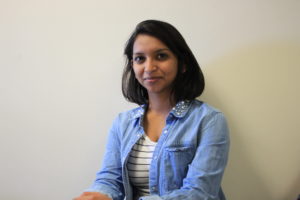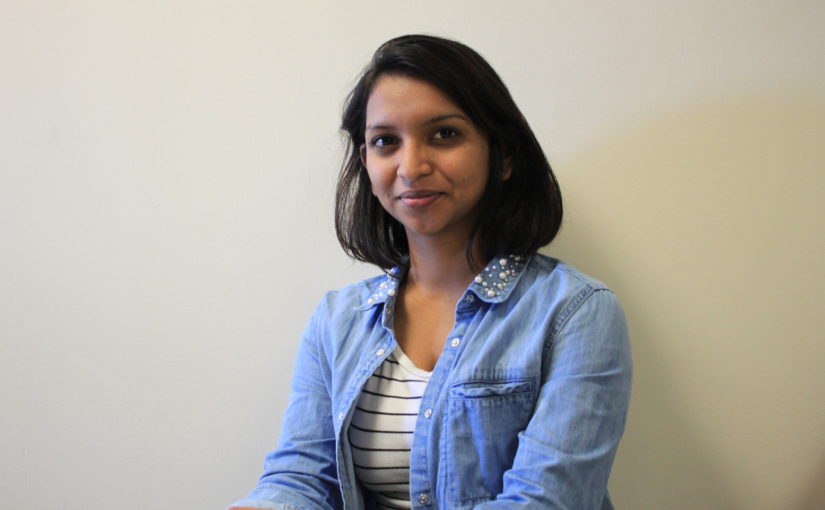When coming to a whole new country for the first time, there could be so many negatives that people endure. Experiences vary from person to person, but a positive attitude could help someone get through any negatives they experience.
Prajakta Warang, an international student at NDSU, spoke about her experience of leaving her home in Bombay, India and coming to Fargo, North Dakota. She made the move to attend NDSU in 2015 and is currently a junior majoring in biotechnology and microbiology. Warang works as a student manager at the Residence Dining Center and was previously a resident assistant. She is also the president of the International Students Association.
Warang grew up speaking Hindi and English equally, while also learning Marathi. She thinks of English as her second language, but still fluently speaks it with her family as well.
When she moved to NDSU, she soon realized that American students tend to bring anything and everything when attending college. “I came with my two backpacks and that’s it,” Warang said. “But when I saw my roommates moving in, I was like — people bring a lot of stuff with them. I could hardly bring my clothes with me. People actually move their houses in. Obviously, you can’t have the microwave on your flight, but when your roommates move in they bring every single thing that they can.”
Warang shared how she grew up watching American television shows like most people do, so it softened the culture shock when coming to America. American TV shows made it so it was not an entirely different country, even though they were not completely accurate. “Like we don’t have proms back home,” Warang said. “We know it from the TV shows so that’s small things (but there’s) still the big picture.”
Warang learned little things from television to prepare her and make her knowledgeable, so she wouldn’t be lost in conversation.

Prajakta Warang explains her transition to America.
But, why America? She explained how she always loved traveling, so this was an opportunity to travel and follow her passion of research all at once.
Why NDSU? Warang said she did many tours and virtual tours with her father. Her father immediately preferred NDSU over the other ones. “He did a bunch of research about the place and about Fargo and NDSU, and he knew I really wanted to be in research,” Warang shared. “(He said) you would really get a chance to do hands on research starting your first year — that was the plus that NDSU gave me.”
She then went on to explain how it was a smooth transition and a very positive experience thus far. “Personally, I would say I only see positive people over here. I have never had a person who not spoke to me, not communicated well with me just because I belong from somewhere else. They’ve always been nice; they’ve always been welcoming.”
Warang gave examples of strangers randomly saying hello to her as she walked by to which she was not used to. It seemed odd to her, but she eventually adapted to this socialized environment. When referring to these little moments, Warang shared, “You wouldn’t see the small picture, the small intricate scenes of things on television, but when experiencing it in person.”
Although her experiences have been positive, she has friends and colleagues that have had differing experiences. Warang explained how sometimes it is someone who grew up in Minnesota and others ask where they are “actually” from. She does not understand why they dig so much into finding where this person’s parents are from and so on. Warang explained another experience a colleague of hers had saying, “‘Oh yeah, you don’t have an accent,’ and she’s like, ‘I grew up here. Why would I have an accent?’ And he was like, ‘No, I was just checking,’ and he walked off.”
The politeness was also a new transition for her because ‘sorry’ and ‘thank you’ are used, but not as frequently in her home country. Another shock was, “In India we would never hold doors for each other – and here everyone was holding doors for me, and I was like, ‘Why is everyone doing that? I can hold my own door,'” Warang said. Although, now when going back home, she holds doors and does not even realize until someone points it out that it is not the norm.
When talking about the easiest adjustment, Warang said it was how nice the people are. However, she was originally concerned about being accepted by people, asking herself questions like, “What are people going to think about me? Are they going to accept me or not?” However, these concerns were unfounded. “But as soon as I started being here, as soon as I started knowing people, acceptance was the really easiest part,” Warang shared.
The hardest adjustment was the food. While India has burgers, she explained how it was not an everyday type of food like it is here.
A concern with moving would be whether homesickness would happen. Although Warang said she has not experienced a lot of homesick days, she shared that when it does happen she says to call friends and family and to keep busy. “Keeping myself busy with something that I chose or being homesick,” Warang shared, saying she would choose to continue to keep herself busy.
Reverse culture shock is also something that does happen. She laughed about how she goes home and sweats instantly because she is used to the cold Midwest weather. “I cannot handle spices anymore,” Warang said. “I can have a tiny bit, but not the amount I used to have when I was home. So your body changes (quicker) than you think; it adapts.”
“For all international students, I would definitely say go get involved,” Warang advised. She’s seen many international students step back in concern they won’t get the job in the interview or won’t be accepted, but she encourages students to go for it saying, “(The) experience will help you in the future.”
With so much happening after the election and how international cultures are being looked down upon or banned, Warang explained her feelings toward this. “I wouldn’t say people never talked about it. I would say people obviously had that in their heart, they had it in their brain, but it just more to show off now. It’s like they know it’s more in the majority now and they can show it off, when before — they would just keep it to themselves. But now people are more to expressing their thoughts.”
How to deal with this new “majority?”
“In a room of 10 people there are always two people who will want to listen to you who don’t think negative things about you — I’m pretty sure that positivity will be 200 times more better than that negativity,” Warang said.
Overall, Warang is proud and positive about her experience in transitioning from India to the United States. However, she still embraces her culture, saying, “That’s my identity; that’s where I am from.”
